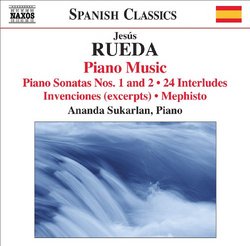| All Artists: Jesus Rueda, Ananda Sukarlan Title: Jesús Rueda: Piano Music Members Wishing: 0 Total Copies: 0 Label: NAXOS SPANISH Original Release Date: 1/1/2009 Re-Release Date: 9/29/2009 Genre: Classical Styles: Chamber Music, Historical Periods, Classical (c.1770-1830) Number of Discs: 1 SwapaCD Credits: 1 UPC: 747313207572 |
Search - Jesus Rueda, Ananda Sukarlan :: Jesús Rueda: Piano Music
CD Details |
CD ReviewsGreat piano music, powerfully played Dean Frey | Red Deer, AB CANADA | 10/29/2009 (5 out of 5 stars) "The Spanish composer Jesus Rueda (b.1961) has found an impressive interpreter in the Indonesian pianist (and composer in his own right) Ananda Sukarlan. Rueda's piano music seems to be about poetry and power in equal measure, and Sukarlan provides both subtlety and muscle in his playing. The "Water Games" of Rueda's first Piano Sonata aren't pretty impressions of sylvan brooks. Rather, they have a relentless drive that might power a decent hydro-electric installation. It's the second Sonata 'Ketjak,' I think, which is the stand-out here. The piece was dedicated to Sukarlan in 2005, and Rueda provides a eastern flavour in Sukarlan's honour (based on Balinese Kecak dance rhythms, according to Sukarlan's excellent liner notes). Both sonatas call for significant piano technique, as does the 1999 'Mephisto', a tour-de-force which Sukarlan calls "terrifying for pianists", though he gets through the piece with aplomb. Play this work and its Lisztian model to celebrate Hallowe'en. The remaining pieces are all "characteristic" pieces in the long tradition of Schumann, Liszt, Prokofiev, Villa-Lobos, and many others. Interlude #13 `Notturno tells a horrifying & moving story in a minute. But pretty much all of these pieces find their mark, and the whole adds up to considerably more than the sum of its parts. I plan to listen to these often! The whole disc is recommended most highly! " Euphonic Modernism Dean R. Brierly | Studio City, CA | 10/26/2009 (4 out of 5 stars) "It's always a pleasure to discover a composer with whom one is unfamiliar. Jesús Rueda is a case in point. One of Spain's most important contemporary musical voices, he is to date sadly underrepresented on disc. Kudos to Naxos then for this recording, which is the first devoted to Rueda's solo piano music. Listening to these five engaging, at times demanding works, one can discern the influence of such composers as Chopin and Ravel filtered through a distinctly modern sensibility. As the pianist on this disc, Ananda Sukarlan, perceptively states in the liner notes, Rueda has "successfully produced a mesmeric blending of `classical' and contemporary elements: his compositions might ask the instrument to whisper in utmost secrecy or, in Walt Whitman's words, to sound its `barbaric yawp over the roofs of the world.'" I don't know about `barbaric,' but the disc's lead piece, "Mephisto," certainly lives up to its name, from its ominous opening chords to its nervous intensity to its percussive note clusters. The composer's "Piano Sonata No. 1" charts similarly dark emotional terrain, but this is balanced by an irresistible melodic drive and shimmering sound colors. Rueda's "Piano Sonata No. 2" is distinguished by its jazz-like rhythms and improvisatory feel--at times it evokes the spirit of an avant-garde jazz pianist like, say, Cecil Taylor. Contrasting these weightier works (although they never sound heavy in an oppressive sense) are two suites comprised of very short piano pieces, many of them under 60 seconds. "Invenciones" is a set of nine deceptively simple statements of an almost singsong character. "24 Interludes" comprises two-dozen gorgeous miniatures that conjure a wide variety of moods, from the contemplative to the ecstatic. Sukarlan, a composer in his own right, proves to be an ideal interpreter of this music, having worked extensively with many other leading Spanish composers. He brings a virtuosic touch to Rueda's more angular and daunting pieces, and mines the emotional possibilities of the more transparent, accessible ones."
|

